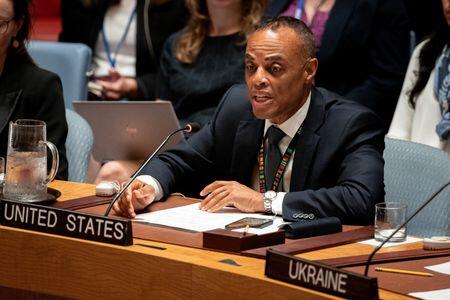The Tensions in Ukraine: A Closer Look at Recent Developments
Intensifying Strikes
In a striking escalation of hostilities, Ukraine has recently endured a barrage of missile and drone attacks from Russia. Early Thursday, these strikes—particularly focused on Kyiv—raised serious concerns regarding Russia’s commitment to seeking peace. U.S. officials have voiced their apprehensions, emphasizing that these acts of aggression contradict any claims of goodwill. U.S. diplomat John Kelley pointedly remarked that such violence casts a shadow over Russia’s intentions in the ongoing conflict.
Call for Constructive Engagement
In light of these developments, the United States has issued a call for Russia to halt its aggressive tactics and engage meaningfully with Ukraine in peace talks. Kelley stressed the necessity for both nations’ leaders to meet, highlighting that diplomatic dialogue remains a critical pathway to resolution. The U.S. is warning that continued aggression could result in economic measures against Moscow, underscoring the gravity of the situation.
Civilian Safety Concerns
The humanitarian implications of these military actions are dire. Ukrainian Prime Minister Yulia Svyrydenko emphasized the need to prioritize civilian safety amidst the ongoing conflict. During her address to the U.N. Security Council, she argued for immediate cessation of strikes, noting that the protection of Ukrainian sovereignty and the well-being of its citizens—especially children—must be central to any future negotiation efforts. The emphasis on a ceasefire as a prerequisite for productive talks underscores the critical condition of peace in the region.
Diplomatic Stalemate
Despite diplomatic attempts to address the crisis, progress has been frustratingly slow. The U.S. President’s meetings with Russian and Ukrainian leaders earlier this month failed to yield significant breakthroughs. As the situation remains precarious, Svyrydenko’s remarks reflecting the urgent need for reliable security guarantees resonate with an international community that finds itself increasingly concerned about the humanitarian toll of continued warfare.
Russia’s Response
Conversely, Russia’s Deputy U.N. Ambassador Dmitry Polyanskiy has asserted that Moscow is open to the possibility of discussing peace terms. However, he emphasized the need for thorough preparation and substantive discussion beforehand, suggesting that a hastily arranged summit would be unproductive. This insistence on preconditions reflects Russia’s cautious approach to negotiations, further complicating the already tenuous peace efforts.
Historical Context
The backdrop to these tensions is the ongoing conflict that escalated dramatically in February 2022. Russia’s declaration of a "special military operation" marked the beginning of a full-scale invasion, driven by claims of a need to "denazify" Ukraine and counter NATO’s expansion. This rhetoric has been widely criticized and challenged by Western nations, intensifying the geopolitical divide.
Conclusion of Events
As the situation continues to unfold, it remains evident that both the U.S. and Ukrainian leadership are advocating for a path to peace that respects sovereignty and prioritizes the safety of civilians. However, the willingness to engage in constructive dialogue remains uncertain, as both sides navigate a fraught landscape marked by escalating hostilities. The international community watches closely, hoping that the growing urgency for a resolution will foster meaningful discussions to ultimately bring an end to the conflict.

